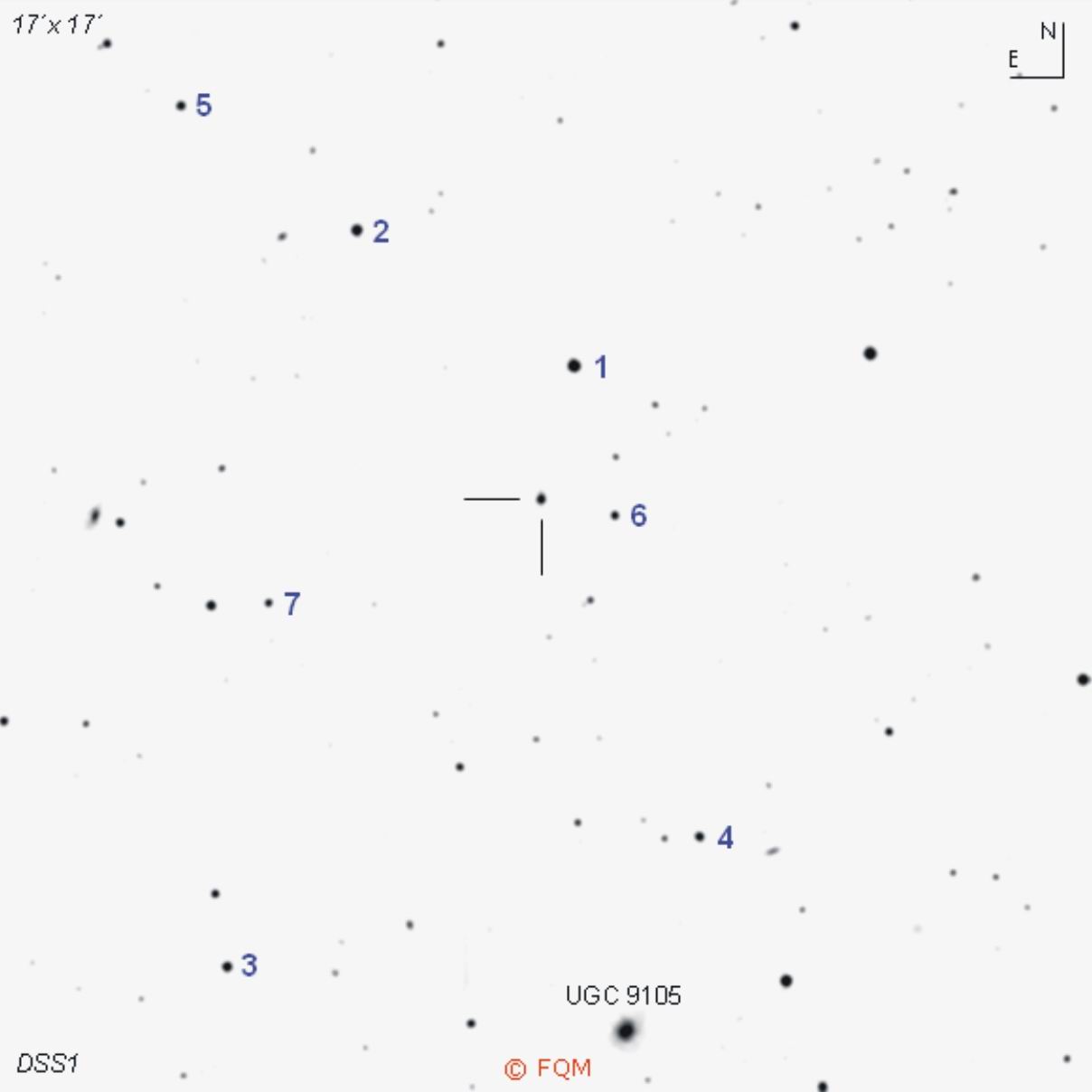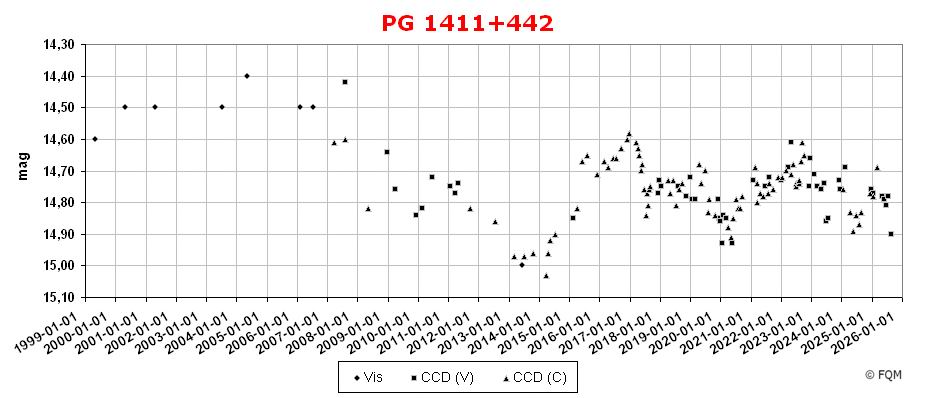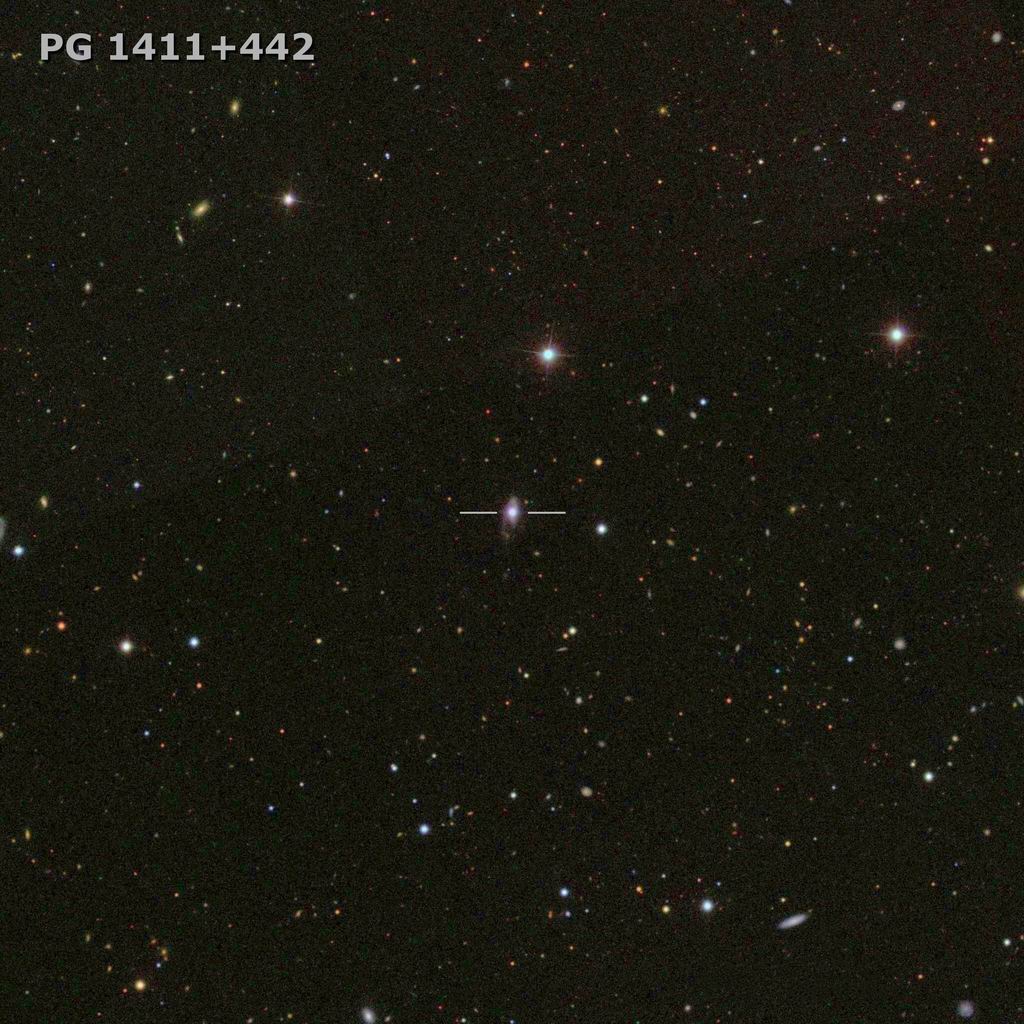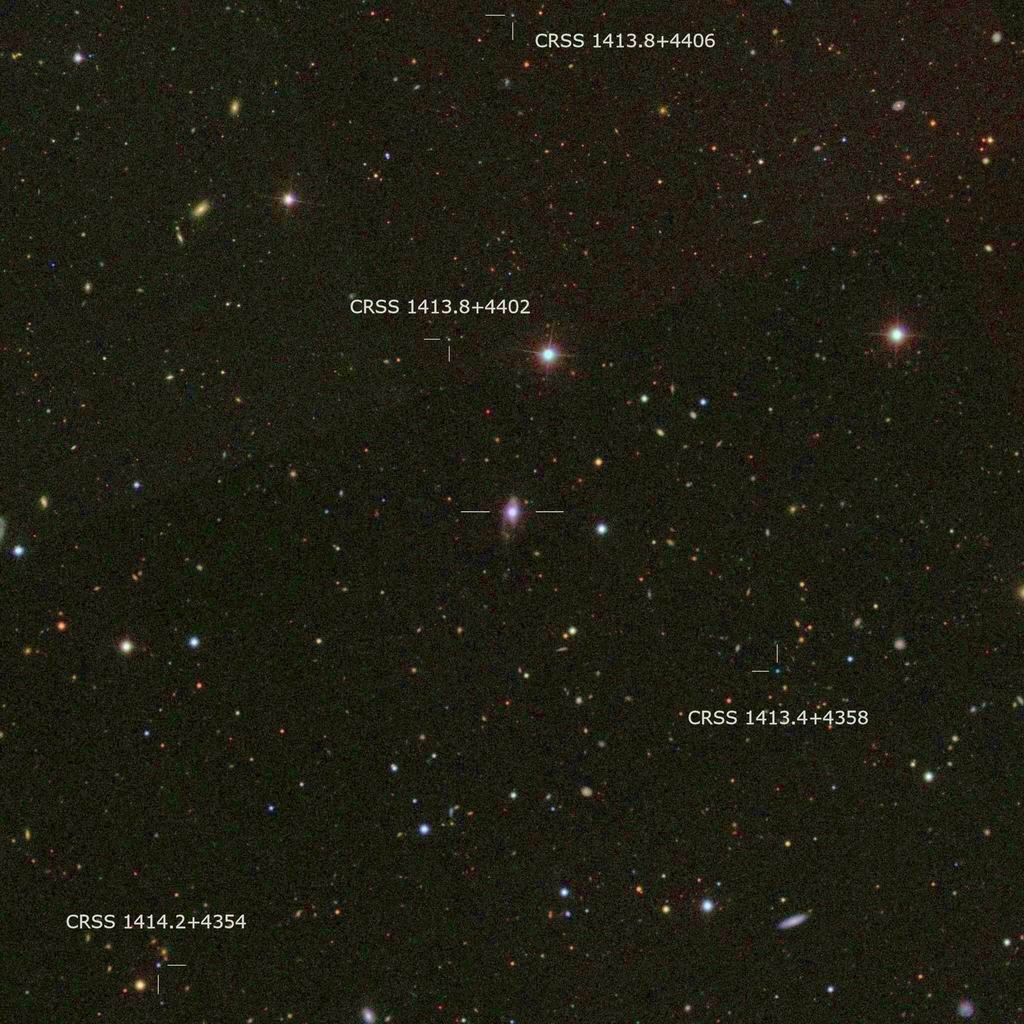
| Frankfurt Quasar Monitoring |
| PG 1411+442 |
| Cross-Identifications | PB 1732, PGC 50824, CSO 423, QSO B1411+4414 1RXS J141349.3+440012, 2XMM J141348.3+440014 2MASS J14134834+4400141, 1WGA J1413.8+4400 SDSS J141348.33+440013.9, FBS 1411+442 GALEXASC J141348.39+440013.1, 1411+442 |
| Equat. coordinates | RA 14 13 48.3 DE +44 00 14 (J2000) |
| Constellation | Bootes |
| Type | QSO |
| Redshift | z=0.089 |
| Distance (2) (3) |
363 Mpc |
| Total mag range (mv) (4) | 14.4 - 15.0 |
| Catalog Magnitude (1) | 14.01 |
| Absolute Magnitude (1) | -24.7 MB |
| Light Travel-Time (2) | 1.134 × 109 yrs |

Comparison stars
| star | B | V |
| 1 | 13.481 (0.025) |
12.745 (0.026) |
| 2 | 14.521 (0.016) |
13.680 (0.033) |
| 3 | 15.273 (0.069) |
14.322 (0.044) |
| 4 | 15.554 (0.030) |
14.786 (0.043) |
| 5 | 15.622 (0.036) |
14.939 (0.027) |
| 6 | 16.193 (0.049) | 15.331 (0.067) |
| 7 |
16.400 (0.031) | 15.632 (0.037) |




| PG
1411+442 is a bright quasar in north-eastern Bootes, only 2.1°
SSW of Lamda (19) Bootis.
The designation PG 1411+442
refers to Palomar-Green Bright Quasar Survey (PG), where this object
was cataloged as a blue stellar object
in 1982.
Follow-up spectroscopic investigations revealed a Seyfert 1-spectrum,
which led to the quasar classification. Initially,
PG
1411+442 was discovered in 1976 as a
blue stellar object by the Palomar-Berger Blue
Star Survey (PB). As a blue
stellar object, it was also detected by the
Case University Survey (CSO). High
resolution photographs show the quasar at the centre of an inclined
spiral
galaxy (PGC), which has an apparent diameter of 40". The quasar host
shows a distorted
spiralarm pattern, with one extended
arm
pointing to the south (see colour chart B). The distortion of the
galaxy disk most probably triggers the quasar activity of the AGN at
the centre of the quasar host. PG 1411+442 is a small amplitude variable object with a total range of less than 1 magnitude. Visual observers need at least an 8- to 10-inch telescope to glimpse this stellar object. Even with large aperture telescopes the quasar remains a stellar object! CCD observers, as well as visual observers, shall use the comparison stars given above. ____________
Besides PG 1411+442, another two quasars might attract your interest. The first one is bright
14-mag quasar MRK 478, which can be found about 10° SE, at a distance of about 1×109
light-years. The second quasar is PG 1415+451,
a 15-mag stellar object just 1° to the
NE. In addition, the surrounding star field of PG 1411+442 offers a by chance aggregation of no less than four faint quasars inside a radius of only 7´, all of them located in the far cosmological background of PG 1411+442 (see colour chart C). And finally, some more deep sky showpieces near quasar PG 1411+442 shall not be missed: M101 (10.5° NW), M51 (8.1° W), and M63 (10.7° SW). |
| Berger, J., Fringant, A.-M. 1977, A&AS, 28, 123; A search for faint blue stars in high galactic latitudes. I. Nine PSS fields near the north galactic pole. Boroson, T.A., Green, R.F. 1992, ApJS, 80, 109; The Emission-Line Properties of Low-Redshift Quasi-Stellar Objects. Giveon, U., Maoz, D., et al. 1999, MNRAS, 306, 637G; Long-term optical variability properties of the Palomar-Green quasars. Hutchings, J.B., McClure, R.D. 1990, PASP, 102, 48; High-resolution optical imaging of three QSOs. Hutchings, J.B., Neff, S.G. 1992, AJ, 104, 1; Optical imaging of QSOs with 0.5 arcsec resolution. Hutchings, J.B., Neff, S.G., et al. 1992, PASP, 104, 62; The Structure of the BAL QSO 1700+518. Karge, S.; Helle Quasare für 8- bis 10-Zoll Teleskope. Ein Beobachtungsführer zur visuellen Beobachtung von Quasaren und BL Lacertae Objekten; Frankfurt 2005. Pennington, R.L., Humphreys, R.M., et al. 1993, PASP, 105, 521; The Automated Plate Scanner Catalog of the Palomar Sky Survey. I. Scanning Parameters and Procedures. Schmidt, M., Green, R. 1983, ApJ, 269, 352; Quasar Evolution derived from the Palomar Bright Quasar Survey and other complete Quasar Survey. Steinicke, W.; Katalog heller Quasare und BL Lacertae Objekte; Umkirch 1998. Véron-Cetty, M.-P., Véron, P. 2001, A&A 374, 92; A Catalogue of Quasars and Active Nuclei: 10th edition. Véron-Cetty, M.-P., Véron, P. 2003, A&A 412, 399; A Catalogue of Quasars and Active Nuclei: 11th edition. Véron-Cetty, M.-P., Véron, P. 2006, A&A 455, 776; A Catalogue of Quasars and Active Nuclei: 12th edition. Véron-Cetty, M.-P., Véron, P. 2010, A&A 518, 10; A Catalogue of Quasars and Active Nuclei: 13th edition. Webb, W., Malkan, M. 2000, ApJS, 130, 165; Comparison star sequences for optical photometry of Active Galactic Nuclei and Quasars. |
| Links: Sloan Digital Sky Survey APASS |
| home |